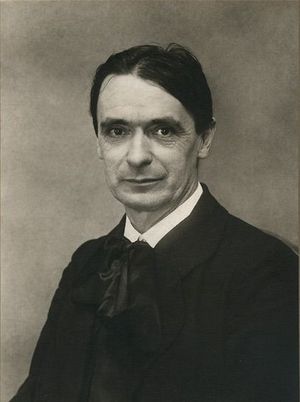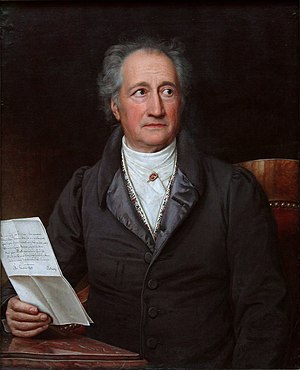Clairvoyance

Clairvoyance generally refers to the ability of non-sensory perception in the broadest sense. People who possess this ability are called clairvoyants - or seers for short. Clairvoyance in the sense meant by Rudolf Steiner is directed towards the perception of the higher supersensible worlds. Modern clairvoyance is based on the trained ability of imagination, which, unlike the old dream-like clairvoyance, is a fully conscious, purely soul-spiritual perception. This includes in particular reading the Akasha Chronicle, the spiritual world memory, in which, however, one does not directly see the outer sensual events, but the spiritual archetypes from which they have emerged.
Imagination differs from vision, in which imaginatively perceived spiritual phenomena in the astral world are unconsciously transferred to the sensual daytime consciousness and directly sensualised. The heightened sensory-free imaginative consciousness, which is brighter than normal everyday consciousness, also excludes any confusion with mere phantasy, arbitrary imaginings or even hallucinations. The clairvoyant ability is all the more highly and purely developed, the higher realms of the world can thereby be perceived in a purely supersensory way. Imagination also differs from extrasensory perception, as it is also studied in parapsychology. This can refer, as was the case with Swedenborg, for example, to simultaneous but distant events, but also to past or future physical events, in which latter case one speaks of precognition.
Epistemological basis



Idealising oil painting by Joseph Karl Stieler, 1828

For Steiner, the starting point of modern self-aware clairvoyance is the observation of thinking, i.e. the intellectual view of one's own thinking activity, through which the I becomes aware of itself, independent of its physical organisation, as a purely spiritual being. Steiner thus ties in directly with the philosophy of German idealism, namely Johann Gottlieb Fichte and Friedrich Wilhelm Joseph Schelling. On 13 January 1881, at 12 midnight, he wrote to his childhood friend Josef Köck in this regard:
„It was the night of 10 to 11 January, during which I did not sleep for a moment. I had been occupied with individual philosophical problems until half past one in the morning, and then I finally threw myself onto my bed; last year, my endeavour was to investigate whether it was true what Schelling said: "We all have a secret, wonderful ability to withdraw from the change of time into our innermost self, stripped of everything that came from outside, and there, under the form of immutability, to look at the eternal in us. I believed and still believe that I have discovered this innermost faculty quite clearly in myself - I had suspected it long ago -; the whole idealistic philosophy now stands before me in an essentially modified form; what is a sleepless night against such a discovery!“ (Lit.:GA 38, p. 13)
Another important foundation of a different kind for Steiner was Johann Wolfgang von Goethe's "Anschauende Urteilskraft" (visual power of judgement), which was directed towards the sensual-supersensory perception of nature and which had led him to the experience of the primordial plant. It is the ideal archetype, the conceptual and at the same time vivid archetype from which all plant species can be imagined to have emerged through modification.
„The archetypal plant becomes the most wonderful creature in the world, which nature itself should envy me for. With this model and the key to it, one can then invent plants into infinity which must be consistent, that is, which, even if they do not exist, could nevertheless exist and are not picturesque or poetic shadows and appearances, but have an inner truth and necessity. The same law will apply to all other living things.“ (Lit.: Goethe's Works WA, p. 203 and 204)
Literature
- Karl von Meyenn (Hrsg.): Wolfgang Pauli. Wissenschaftlicher Briefwechsel, Band III: 1940–1949. Springer. Berlin (1993) Brief #929, S. 496
- H. Atmanspacher, H. Primas, E. Wertenschlag-Birkhäuser (Hrsg.), Der Pauli-Jung-Dialog, Springer Verlag, Berlin Heidelberg 1995
- Goethes Werke, Vollständige Ausgabe in vierzig Teilen, Auf Grund der Hempelschen Ausgabe, Deutsches Verlagshaus Bong u. Co, Berlin Leipzig Wien Stuttgart, 38. Teil
- Goethes Werke (WA). Hrsg. im Auftrage der Großherzogin Sophie von Sachsen. Weimar 1887-1919. Abteilung IV 8, Briefe
- Immanuel Kant, Kritik der Urteilskraft, § 77
- Flensburger Hefte Nr. 66: Hellsehen - Der Blick über die Schwelle, Flensburger Hefte Vlg., Flensburg 1999
- Flensburger Hefte Nr. 107: Neues Hellsehen, Flensburger Hefte Vlg., Flensburg 2010
- Rudolf Steiner: Ein Weg zur Selbsterkenntnis des Menschen, GA 16 (2004), ISBN 3-7274-0160-5; zusammen mit GA 17 in Tb 602, ISBN 978-3-7274-6021-0 English: rsarchive.org German: pdf pdf(2) html mobi epub archive.org
- Rudolf Steiner: Die Schwelle der geistigen Welt, GA 17 (1987), ISBN 3-7274-0170-2 English: rsarchive.org German: pdf pdf(2) html mobi epub archive.org
- Rudolf Steiner: Philosophie und Anthroposophie, GA 35 (1984), ISBN 3-7274-0350-0 English: rsarchive.org German: pdf pdf(2) html mobi epub archive.org
- Rudolf Steiner: Briefe Band I: 1881 – 1890, GA 38 (1985), ISBN 3-7274-0380-2 English: rsarchive.org German: pdf pdf(2) html mobi epub archive.org
- Rudolf Steiner: Die Erkenntnis der Seele und des Geistes, GA 56 (1985), ISBN 3-7274-0560-0 English: rsarchive.org German: pdf pdf(2) html mobi epub archive.org
- Rudolf Steiner: Spirituelle Seelenlehre und Weltbetrachtung, GA 52 (1986), 30. März 1904, Berlin English: rsarchive.org German: pdf pdf(2) html mobi epub archive.org
- Rudolf Steiner: Das Lukas-Evangelium, GA 114 (2001) English: rsarchive.org German: pdf pdf(2) html mobi epub archive.org
- Rudolf Steiner: Wie erwirbt man sich Verständnis für die geistige Welt?, GA 154 (1985), ISBN 3-7274-1540-1 English: rsarchive.org German: pdf pdf(2) html mobi epub archive.org
- Rudolf Steiner: Die tieferen Geheimnisse des Menschheitswerdens im Lichte der Evangelien, GA 117 (1986), ISBN 3-7274-1170-8 English: rsarchive.org German: pdf pdf(2) html mobi epub archive.org
- Rudolf Steiner: Wege der geistigen Erkenntnis und der Erneuerung künstlerischer Weltanschauung, GA 161 (1980) English: rsarchive.org German: pdf pdf(2) html mobi epub archive.org
- Rudolf Steiner: Kunst und Kunsterkenntnis, GA 271 (1985), ISBN 3-7274-2712-4 English: rsarchive.org German: pdf pdf(2) html mobi epub archive.org
 |
References to the work of Rudolf Steiner follow Rudolf Steiner's Collected Works (CW or GA), Rudolf Steiner Verlag, Dornach/Switzerland, unless otherwise stated.
Email: verlag@steinerverlag.com URL: www.steinerverlag.com. Index to the Complete Works of Rudolf Steiner - Aelzina Books A complete list by Volume Number and a full list of known English translations you may also find at Rudolf Steiner's Collected Works Rudolf Steiner Archive - The largest online collection of Rudolf Steiner's books, lectures and articles in English. Rudolf Steiner Audio - Recorded and Read by Dale Brunsvold steinerbooks.org - Anthroposophic Press Inc. (USA) Rudolf Steiner Handbook - Christian Karl's proven standard work for orientation in Rudolf Steiner's Collected Works for free download as PDF. |
